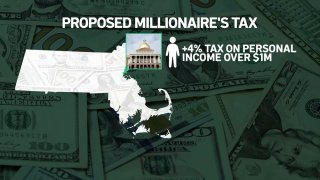
A group of Massachusetts residents thinks the state's education and transportation systems need to be better funded.
"We need more funding when it comes to education and public transportation," said Gerly Adrien. "And a way to do this is the Fair Share Amendment."
So Adrien, a director of "Fair Share for Massachusetts," is working to get a ballot question commonly known as the "millionaire's tax" passed in November.
"Millionaires who make more than a million, are they paying their fair share?" Adrien asked. "The answer is, they're not."
Get New England news, weather forecasts and entertainment stories to your inbox. Sign up for NECN newsletters.
The measure, which would amend the state constitution, would put an extra 4% tax on any state resident's personal income over $1 million.
For example, if you had personal income of $1.5 million, the first million would be taxed at the current rate of 5.5%, or $55,000. The extra $500,000 would be taxed at 9% or $45,000. You would pay $17,500 more.
The projected $1.5 billion raised would be targeted for education and transportation. And for many residents, it's not a bad idea.
"I could get behind that, yeah," said Jeff Smith of Fitchburg.
"I do think people who make over $1 million should be taxed more than people who don't," said Sahai Stevens of Boston.
"I think that's a good idea to reallocate the money back into the economy for other people," said Jordan Albano of Newton.
More on the millionaire's tax
But not everyone likes the idea. Dan Cence heads up the Coalition to Stop the Tax Hike Amendment. He argues that there would be unintended consequences that would have a negative affect on the state.
"Small businesses will leave. High earners will leave. There'll be a brain drain. There'll be an economic drain," Cence said.
He also questions how much extra funding will actually go to transportation and education, since it is the Massachusetts Legislature that allocates the funding.
"When the levels that the legislature sets are met, any increase in that will go back to the general fund and can be spent anywhere they see fit," Cence said.
Still, polling shows opponents of the millionaire's tax face an uphill battle.
"Most people in Massachusetts know they're never going to earn a million dollars," said Evan Horowitz of the Tufts Center for State Policy Analysis.
How many people in the state would qualify?
"It's about 6% of households, or 20,000 households," Horowitz said. "It's not very many people."
Horowitz says many people could be subject to this tax just once in their lifetime, thereby affecting more taxpayers over time.
"Let's say you, you know, you're a dentist. You've built up a practice. You never earned $1 million in any given year. And then one year, you sell your practice. You're ready to retire. And that year that you sold your practice, yeah, you earned $1 million and you will pay this," he explained.
The same would apply for the one-time sale of a house. And if it was purchased 40 years ago, Cence said, "That house is worth a lot of money today. And when they go to sell it, perhaps it's their retirement. Perhaps it's passing that down to their children. They're going to pay 80% more income [tax] on that house."
"I came from Brazil like 18 years ago looking for the American dream," said small business owner Ricardo Souza.
He says he spent years doing manual labor and going to school to become a master plumber so that he could finally open his own business.
"We are not millionaires. We are not. But we are going to be affected," he said.
Souza says profit margins for small businesses are razor-thin, and that every extra dollar he makes needs to be reinvested into his company.
Asked how he thinks the tax would affect him, he said, "All the workers are going to be affected because I won't be able to survive. I'm going to have to lay people off."
Adrien isn't buying that argument.
"They are scaring people," she said. "The truth is it's on your personal income over $1 million."
If the ballot question is successful, voters will be living with the tax for the long term, as constitutional amendments are difficult to reverse.
"With a law, you can just say, 'Well, we did it, let's repeal it. We're done.' That won't be an option if this passes," Horowitz said.


